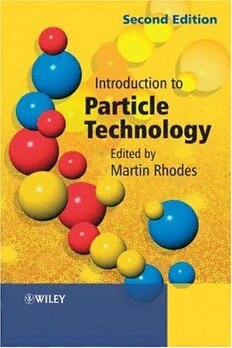Download Introduction to Particle Technology PDF Free - Full Version
Download Introduction to Particle Technology by Martin Rhodes in PDF format completely FREE. No registration required, no payment needed. Get instant access to this valuable resource on PDFdrive.to!
About Introduction to Particle Technology
Particle technology is a term used to refer to the science and technology related to the handling and processing of particles and powders. The production of particulate materials, with controlled properties tailored to subsequent processing and applications, is of major interest to a wide range of industries, including chemical and process, food, pharmaceuticals, minerals and metals companies and the handling of particles in gas and liquid solutions is a key technological step in chemical engineering.This textbook provides an excellent introduction to particle technology with worked examples and exercises. Based on feedback from students and practitioners worldwide, it has been newly edited and contains new chapters on slurry transport, colloids and fine particles, size enlargement and the health effects of fine powders. Topics covered include:Characterization (Size Analysis)Processing (Granulation, Fluidization)Particle Formation (Granulation, Size Reduction)Storage and Transport (Hopper Design, Pneumatic Conveying, Standpipes, Slurry Flow)Separation (Filtration, Settling, Cyclones)Safety (Fire and Explosion Hazards, Health Hazards)Engineering the Properties of Particulate Systems (Colloids, Respirable Drugs, Slurry Rheology)This book is essential reading for undergraduate students of chemical engineering on particle technology courses. It is also valuable supplementary reading for students in other branches of engineering, applied chemistry, physics, pharmaceutics, mineral processing and metallurgy. Practitioners in industries in which powders are handled and processed may find it a useful starting point for gaining an understanding of the behavior of particles and powders.Review of the First Edition taken from High Temperatures - High pressures 1999 31 243 – 251''.. This is a modern textbook that presents clear-cut knowledge. It can be successfully used both for teaching particle technology at universities and for individual study of engineering problems in powder processing.''
Detailed Information
| Author: | Martin Rhodes |
|---|---|
| Publication Year: | 2008 |
| ISBN: | 9780470014271 |
| Pages: | 475 |
| Language: | English |
| File Size: | 4.614 |
| Format: | |
| Price: | FREE |
Safe & Secure Download - No registration required
Why Choose PDFdrive for Your Free Introduction to Particle Technology Download?
- 100% Free: No hidden fees or subscriptions required for one book every day.
- No Registration: Immediate access is available without creating accounts for one book every day.
- Safe and Secure: Clean downloads without malware or viruses
- Multiple Formats: PDF, MOBI, Mpub,... optimized for all devices
- Educational Resource: Supporting knowledge sharing and learning
Frequently Asked Questions
Is it really free to download Introduction to Particle Technology PDF?
Yes, on https://PDFdrive.to you can download Introduction to Particle Technology by Martin Rhodes completely free. We don't require any payment, subscription, or registration to access this PDF file. For 3 books every day.
How can I read Introduction to Particle Technology on my mobile device?
After downloading Introduction to Particle Technology PDF, you can open it with any PDF reader app on your phone or tablet. We recommend using Adobe Acrobat Reader, Apple Books, or Google Play Books for the best reading experience.
Is this the full version of Introduction to Particle Technology?
Yes, this is the complete PDF version of Introduction to Particle Technology by Martin Rhodes. You will be able to read the entire content as in the printed version without missing any pages.
Is it legal to download Introduction to Particle Technology PDF for free?
https://PDFdrive.to provides links to free educational resources available online. We do not store any files on our servers. Please be aware of copyright laws in your country before downloading.
The materials shared are intended for research, educational, and personal use in accordance with fair use principles.

